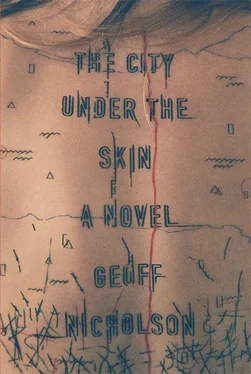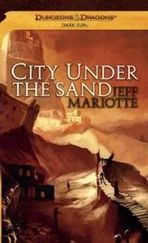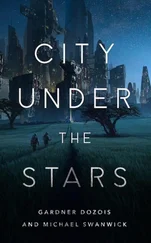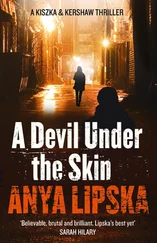“Even if they find me, that doesn’t mean they’ve caught me. That’s when the fun really starts.”
“Gosh, you sure are tough, Mr. Wrobleski. Tough and grouchy; I’ll bet that makes you a lot of friends.”
“Kid, shut up.”
Then, out of nowhere, there was the sound of a deep, booming explosion, a sustained bass rumble, as though the earth around them was growling. Without thinking, Carla grabbed Wrobleski’s hand, as if he were her protector, but then she immediately threw it aside, ashamed. Wrobleski was almost as surprised. In spite of everything, he actually felt somehow protective toward this infuriating little brat: he didn’t completely hate the touch of her hand.
“It’s all right,” he said as gently as he knew how. “It’s nothing. It happens all the time down here. It’s the new subway line.”
The sounds receded, the tremble diminished, though Carla continued to feel ashamed of herself.
* * *
In a tunnel not so far away, Billy Moore absorbed that same bass sound.
“Looks like the Platinum Line is getting by without that dynamite,” Zak said.
“Quiet,” said Billy. “I’m trying to listen. I’m trying to hear my daughter.”
Zak Webster, Billy Moore, and Marilyn Driscoll moving through the underworld: brains, brawn, good looks, not necessarily in that order, and not evenly or discretely distributed. They plodded along a storm drain, the flashlights modeling yellow-gray cones through the darkness ahead of them. They were not exactly lost, but they had no clear notion of where they were heading. Sometimes they thought they heard voices and footsteps, but they knew it might be their own echoing back at them. Certain spaces and constrictions seemed more inviting than others, but to what were they an invitation? The darkness simultaneously beckoned and repelled, the air was thinner and colder than any surface air, and unidentifiable smells wafted through the tunnels, often foul, but sometimes surprisingly, incomprehensibly sweet.
“I suppose there must be maps of this place,” said Marilyn.
“Sure,” said Zak. “I know collectors who are only interested in maps of sewers, catacombs, subway systems.”
“You hang with a really interesting crowd, don’t you, Zak?” said Billy.
Zak didn’t react to that one. Instead, he said, “Did you ever kill anybody, Billy?”
“No,” Billy admitted, “but some people probably think I did, and that has its advantages.”
“How about Wrobleski? Does he think that?”
“By now Wrobleski will have realized he knows absolutely nothing about me. Or about you either, Zak. That’s good. He won’t know what he’s dealing with. We could have more dynamite. We could have tear gas and stun grenades. We could be armed to the teeth.”
“But we’re not, are we?”
“No,” said Billy. “But he doesn’t know that.”
“I think he might have a suspicion,” said Zak.
* * *
Wrobleski was taking Carla to the one place he knew well belowground, the abandoned subway station. It was by no means a sanctuary, but it was where he had done some of his best work, where he had functioned with grim efficiency. He was familiar with its spaces and enclosures. He could lie in wait. He could face whatever he had to face.
They came to the low masonry of the arch that led through to the long, straight subway platform. Wrobleski shunted Carla inside, nodding his head, turning it, so that the light beam on his helmet moved steadily and with purpose, revealing the tilework, the benches, the rails, the darkness beyond.
“What is this?” Carla said. “Your own private train set?”
She wandered to the edge of the platform, and Wrobleski said, “Be careful, don’t get too near.”
She laughed at him. “What? You’re scared something might happen to me?”
“Damn right,” he said. “You’re no good to me broken.”
He stood beside her and looked down, so that his helmet light shone between the twisted rails, into the deep, shapeless cavity below them.
“What’s that?” said Carla.
“It’s a sinkhole.”
“What’s that?”
“A wonder of nature. Either that or a collapsed sewer. Good place for stashing things, just so long as you don’t ever want them back.”
Carla took a couple of slow steps away from the edge, her curiosity hardly satisfied.
“So how is this going to work out exactly?” she said. “We’re just going to hide down here until they get bored and go away?”
“That’s one way it might work.”
“Not very likely, though, is it?” she said. “Or there’s a big shoot-out? Or you say, ‘Give me free passage, otherwise the kid dies’?”
“There are worse ideas.”
“And then what?” said Carla. “They give you a helicopter and a suitcase full of money?”
“A suitcase full of money always comes in handy.”
“Or,” she said, “you could just turn yourself in. Say you’re sorry. Make a confession. It would be good for your soul.”
“I don’t have a soul,” said Wrobleski, “and neither do you.”
* * *
Marilyn, Billy, and Zak pressed on ever more uncertainly. Zak thought he heard rats; at least he hoped it was rats. The tunnel diameter was narrow; the sides were caked in soft, loamy residue, a few inches of water slopped around their feet. Then the diameter reduced even farther, like a large intestine becoming smaller, with black fronds of what looked like half-digested seaweed hanging from the walls. Zak felt as though he were inside the city’s gut. He wondered when and where he would be excreted.
They turned a corner and came to an abrupt dead end, a stretch of ragged tunnel blocked solid by debris. The roof had caved in, recently it appeared, a distant fallout from the subway line excavations. Concrete, earth, sections of ancient pipe, miscellaneous chunks of rock and ore had sunk down from above and were now filling the whole tunnel, side to side, top to bottom. Only a monstrous piece of machinery would be able to dig a way through. They would have to go back, pick a different route, start again.
“This is okay,” Zak said, looking desperately, unconvincingly on the bright side. “At least we know they didn’t come this way. We’re narrowing the possibilities.”
“No, we’re not,” said Billy. “The possibilities are pretty much endless. This is fucking hopeless. We don’t know where we are, we don’t know where we’re going.”
“Well,” Zak hazarded, “getting lost is a form of mapping.”
“Form of mapping, my ass,” said Billy.
* * *
Carla Moore and Wrobleski sat together on a bench on the empty subway platform, backs resting against the curved tile wall behind them, commuters waiting for a ghost train that would never come. She was tired and scared, and she would have been tearful if she’d allowed herself to be, but she wasn’t going to show any of that. Wrobleski kept watch along the length of the platform so he could see the entrance arch through which any new arrival would have to come, if they ever did. He told himself he was ready for anything they could throw at him, regardless of who “they” were, but there was no denying (much as he’d have liked to deny it) that he was feeling very weary; he realized he was also feeling very old.
“How’s your hand?” Carla asked.
“It hurts,” said Wrobleski.
“And how’s that gouge in your face?”
“How do you think?”
“And the cactus spines?”
“Give it a rest, kid.”
Something slithered and twitched down in the gloom at the platform’s edge, something with too many legs, something the color of dust and shed skin. Wrobleski had to make quite an effort to stop himself from shooting into the darkness.
“Don’t you have a first-aid kit down here?” asked Carla.
Читать дальше












